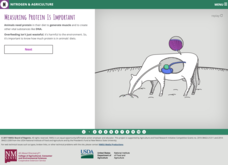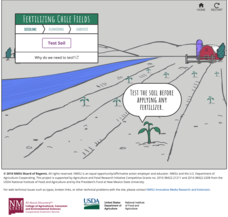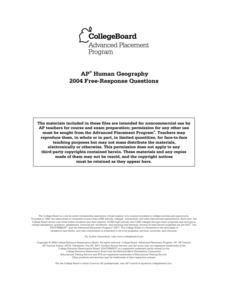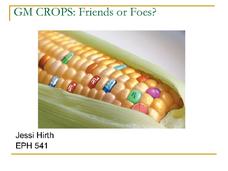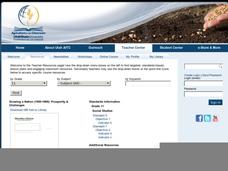Learning Games Lab
Scientific Graph Reading
Interpreting graphs is an essential skill for young scientists. An interactive online lesson gives individuals an opportunity to review the components of a graph and learn to read and interpret the shape of a graph. The lesson includes...
Learning Games Lab
Nitrogen in Pollutants
Responsible farming is important for maintaining natural resources. Eager scientists complete a WebQuest to explore what happens to nitrogen when it enters the soil. They learn about the chemical makeup of nitrogen-based molecules and...
Learning Games Lab
Nitrogen in Fertilizer
Nitrogen is an essential element for productive farming. An interactive lesson explores the chemical makeup of different fertilizers and their corresponding nitrogen content. The interactive challenges individuals to complete molecular...
Learning Games Lab
Nitrogen in Feed
Knowing what farmers are feeding livestock is just smart business. A WebQuest lesson helps learners build an understanding of the relationship between amino acids, nitrogen, and protein. With interactive instruction, scholars practice...
Learning Games Lab
Cattle Feeding
Finding a balance between too much protein and not enough doesn't have to be a guessing game. Young scientists use an interactive lesson to learn how to calculate protein content in cattle feed and how to mix feed to create the ideal...
Learning Games Lab
Fertilizing Chile
Fertilizer can mean the difference between a profit and a loss. Scholars use an online interactive to explore the effects of fertilizing in agriculture. Given information about the nitrogen levels in the soil, they decide the fertilizer...
Learning Games Lab
Water Sampling
Scientific procedures ensure valid data and valid results. Use a water sampling interactive to teach learners the procedures for collecting water samples. The interactive takes users through the process step-by-step with notes of...
Agriculture in the Classroom
Design 'Y'er Genes
How do changes in DNA affect an organism? Scholars explore chromosomes, genes, DNA, and mutations by modeling the DNA of a strawberry. They build a DNA model, then manipulate it to show how changing the genes transforms the strawberry...
PBS
Organizing the Farm Worker Movement
The food on young scholars' tables was likely harvested by hands that fought for fair wages and working conditions. By examining the life of Cesar Chavez and Dolores Huerta, learners connect their daily meals with the struggles of those...
Jamestown-Yorktown Foundation
What Was Everyday Life like in Colonial Virginia?
After reflecting on jobs people perform in the present day, scholars discuss what they believe jobs would have been like in Colonial Virginia during the American Revolution. Small groups then perform a jigsaw using informational packets....
Arbor Day Foundation
Trees: A Joy Forever
This Arbor Day, put on a show! A three-scene play follows a boy and girl that run into Arbor Day founder, J. Sterling Morton. Morton describes how the holiday came to be and discovers how his hard work has grown into a national...
College Board
2009 AP® Human Geography Free-Response Questions
Why have organic farms increased while dairy farms have decreased? Learners unravel this and other questions about geography, religion, and urban living patterns in a set of assessment questions. The resource includes short-answer...
College Board
2012 AP® Human Geography Free-Response Questions
Why do countries create boundaries? Scholars explore similar ideas using prompts from the 2012 AP Human Geography test. Pupils also test their acumen with questions on agriculture and the growth of Islam.
College Board
2004 AP® Human Geography Free-Response Questions
Human geography involves everything from why people build factories along the United States-Mexico border to how land-use patterns and demographics are related. So, how do test-takers put it all together? Focused questions from an AP...
College Board
2016 AP® Human Geography Free-Response Questions
Do your learners have the test-day jitters? Questions from the 2016 administration of the AP Human Geography exam allow for extra practice on topics such as economic activity, national identity and language, and agricultural practices....
Serendip
Food, the Carbon Cycle and Global Warming
As the world population increases, demands on the carbon cycle also increase. A well-designed lesson first explores the greenhouse effect and its impact on global warming. Further sections have pupils study the effect of greenhouse gases...
Agriculture in the Classroom
Farmland: GMOs and Organic Agriculture
Learn more about genetic modification, organic farming, and the role of biotechnology in agriculture by watching a documentary that shows how newly gained knowledge can be applied to specific situations involving farmers and the choices...
Missouri Department of Elementary
Equine Science
Did you know that horses have two sets of teeth? There is much to learn about horses, of course, and those interested in equine science will learn much from a 10-lesson agricultural science course that covers not only equine dental and...
Kenan Fellows
Farm to Fuel: The Alternative Fuels Industry
Need a lesson to fuel young minds? A variety of hands-on activities is sure to get your class fired up! Beginning with an introductory slideshow and culminating with group presentations, the week-long unit has something for everyone....
Curated OER
GM Crops: Friends or Foes?
Genetically modified crops—How do you feel about them? Here, explore the benefits and risks of GM crops to inform your opinion.
Pulitzer Center
Food Insecurity
Food insecurity, whether as a result of food scarcity or a lack of nutritious food, is a growing and serious problem in the world today. After discussing the concept of food insecurity, learners listen to an NPR radio broadcast on the...
PBS
The Impact of Genetically Modified Seeds
What is all the fuss about genetically modified foods? PBS provides this resource designed to supplement the documentary Food, Inc. to help learners investigate the benefits and controversies of genetically modified foods for individuals...
Agriculture in the Classroom
Growing a Nation (1950-1969): Prosperity & Challenges: The Story of American Agriculture
A wonderful lesson plan on the development and impact of mechanized farming! History or agriculture classes learn the historical background of the United States' food production by creating a pamphlet with information on the cause and...
Agriculture in the Classroom
Growing a Nation: Into a New Millennium 1970-Present
If you want to focus on critical thinking skills, this well-constructed series of activities will challenge your history or agriculture class to evaluate the effectiveness of administrative decisions related to agricultural and the...





